Education is fundamental in attracting foreign investment, particularly in the regions of the country where we do not always have enough people with the necessary skills in
Equal opportunities from the beginning should be one slogan, and education is the main issue here. We need to move from where we are now—with everyone guaranteed an education under the constitution—to the point where everybody gets an education of excellent quality. This is not just a matter of social justice; education is a vital economic agent. We have a particular problem in
Privatization is all about execution and creating value at the end of the day; you can have good ones like British Airways and bad ones like the railways in
Saturday, December 02, 2006
Education and privatization in Nepal:
Saturday, November 04, 2006
How to give your brain a workout:
Chew gum: This increase activity in the hippo campus, the part of the brain important for short term memory.
Learn a second language, forcing your brain to continuously switch tarcks. This is one of the most mentally demanding things we can do.
Watch less television
Eat food high in Omega 3 fatty acids such as berries, seeds, turkey and fish.
Sunday, October 15, 2006
What is Knowledge?
Unlike capital and labour, knowledge strives to be a public good). Once knowledge is discovered and made public, there is zero marginal cost to sharing it with more users. Secondly, the creator of knowledge finds it hard to prevent others from using it. Instruments such as trade secrets protection and patents, copyright, and trademarks provide the creator with some protection.
Knowledge based economy is based on Know-why and know-who matters more than know-what. There are different kinds of knowledge that can usefully be distinguished. Know-what, or knowledge about facts, is nowadays diminishing in relevance. Know-why is knowledge about the natural world, society, and the human mind. Know-who refers to the world of social relations and is knowledge of who knows what and who can do what. Knowing key people is sometimes more important to innovation than knowing scientific principles. Know-where and know-when are becoming increasingly important in a flexible and dynamic economy. Know-how refers to skills, the ability to do things on a practical level.
Knowledge gained by experience is as important as formal education and training. The implication of the knowledge economy is that there is no alternative way to prosperity than to make learning and knowledge-creation of prime importance. There are different kinds of knowledge. "Tacit knowledge" is knowledge gained from experience, rather than that instilled by formal education and training. In the knowledge economy tacit knowledge is as important as formal, codified, structured and explicit knowledge.
According to New Growth economics a country's capacity to take advantage of the knowledge economy depends on how quickly it can become a "learning economy'. Learning means not only using new technologies to access global knowledge, it also means using them to communicate with other people about innovation. In the "learning economy" individuals, firms, and countries will be able to create wealth in proportion to their capacity to learn and share innovation (Foray and Lundvall, 1996; Lundvall and Johnson, 1994). Formal education, too, needs to become less about passing on information and focus more on teaching people how to learn.
Life long learning is vital for organisations and individuals. At the level of the organisation learning must be continuous. Organisational learning is the process by which organisations acquire tacit knowledge and experience. Such knowledge is unlikely to be available in codified form, so it cannot be acquired by formal education and training. Instead it requires a continuous cycle of discovery, dissemination, and the emergence of shared understandings. Successful firms are giving priority to the need to build a "learning capacity" within the organisation.
Wednesday, September 06, 2006
The reactionary revolutionary:
I think, hate has kindled hate for centuries, and yet Nepal’s King still thinks that repression is the only way to prevent rebellion of Moist and other political parties. Today, His politics activities show that he is the force, he is the order and rest of all who oppose his policies are the disorder. Like Bush, he does not defend an idea, he responds to the fears that he himself instills in people’s heads.
King Ganendra is certainly wanted to be a little King Mahendra. I don’t know if he has the potential of real one, but it will be impossible to say tomorrow that we didn’t know. For his part, King Ganendra appears repentant about controversy he has helped arouse–although his policy makers admit that he has been living through the most testing time in his life. Indeed, he now seems to be revelling in his new–found notoriety, which scarcely dented his popularity rating.
Democratic order must be restored before the current could introduce any other policies to help disadvantaged minorities. The riots and rallies have shown that Nepal has reached a “moment of truth” and is crying out for a “rupture” with the failed policies of the past. We must change our country, we must change profoundly, we must break with the political, economic and social system that has for 100 years only produce debt, unemployment, and stagnation. That is why we all Nepalese people appeal for a clean break.
Nepalese society is based on strictly hierarchical norms and the age-old basis of caste system traditional socio-cultural values norms and beliefs. Poverty has to be scrutinised in the light of politico- economic, socio-cultural and psychological issues by keeping in mind of broader geographical, demographic, ecological, socio-cultural, religious and politico-economic context.
There are so many leaders in the world who did everything for sake of development in their country. We can take an example of General de Gaulle in 1945 and in 1958 who established the fifth Republic in France. We want such a leader who can transform Nepal, challenging conservatism without taboo like General de Gaulle in France did. Government should change the institutions, economic policy, social welfare, the civil service, foreign policy and defence, taxes and culture. The crisis in Nepal has revealed in cruel way the realities that have been observing for several years: our country needs radical transformation.
Nepal is the wellspring of peace ideas “likes Gautam Buddha” and inspiration to the world, is in danger of spluttering into global irrelevance, becoming a mere “theme park for tourist”. The vitality of the world’s second rich water resources economy has been sapped by over-funded country and the oppressive build-up of public debt, its entrepreneurial energies have been dulled by taxes and its social “elevator”, allowing the poor and excluded minorities to be integrated into Nepalese society, has broken down as unemployment rate has been struck at around 50-60 percent for a generation. Nepalese society is sclerotic, blocked, immobile and paralysed by quasi-castes, who enjoy enormous benefits and privileges while denying them outsiders.
The much-vaunted Nepalese social model, which trumpets the principle of equality, has in practice produce inequality. Racial discrimination is rooted in Nepalese society no matter whether the country formally adheres to the Human rights policy or not. Positive discrimination is still discrimination which should be illegal in Nepal. Corrective measures are needed.
Abraham Lincoln had stressed about politics “by the people, for the people”. Some our politicians too speak the same language on all public platforms but in actual practice they set an example of corruption, crime and so on. Every citizen is of the view that no government in Nepal can ever be expected to be brutally sincere; it can only be sincerely brutal. Nepalese politics should have entered post-ideological phase, in which politicians must devise clear solutions to voters’ immediate concerns rather than appealing to their idealistic instincts. “One notices more and more in our electoral analyses that voters are individualistic, critical and well-informed, and that in deciding their political choice they increasingly fix on concrete issues. The ideological vote-whether it is socialist, or Marxist, or liberal-is changing to one based on what affects people in their daily lives. People vote for their personal interests at the time of voting.”
Nepalese politician should be practical in other terms should be interested in how a policy might work in practice than in theory. If somebody ask about deep down then the answer should be in one word: pragmatism.
Teachers, social workers, police officers, doctors and youth associations all had a responsibility to identify and tackle problem cases early and Government should do more to deal with every single problem. To avoid becoming human animals we must escape the society of selection in which we live, a society of repression, impoverishment, of voyeurism and fear, where the cop, violence, force and sexual licence have replaced dignity, dialogue, justice and love.
Tuesday, August 08, 2006
Human Factor:
Human Factors (HF) professionals contribute to the design and evaluation of tasks, jobs, products, environments and systems in order to make them compatible with the needs, abilities and limitations of people. At Paragon, HF principles are applied to the specification, design, evaluation, operation and maintenance of oil & gas and maritime equipment to enhance safety, efficiency of personnel and job satisfaction.
Can Human Factors Affect the "Bottom Line"?
HF principles applied during design to reduce the potential for human error can lead to improved system reliability and maintainability, allowing a system to sustain greater levels of availability or uptime. Evidence shows that the revenue generated by a system will increase as a function of system.
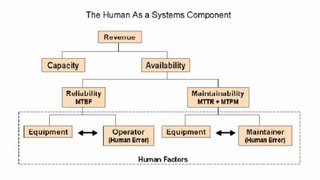
The HF Group has worked most recently in five key areas: new facilities design and construction, control room studies, training, incident investigation and development of design guidelines and specifications.
Monday, July 31, 2006
The basic needs of human life:
Every living thing need to satisfy a variety of conditions which are commonly known as material needs, for example: food, housing, heating, energy. When all those conditions are met then it is experienced as material well–being. In case those conditions are not met then suffering takes place in the form of hunger, poverty, illness, and death.
Syntropy is the main source from which life gets its energy and its movement. If the connection of syntropy will lost in this case, entropy prevails, and the living system dies. It is necessary to be connected with syntropy in order to stay alive. This need is felt in the form of attraction and love. When this need is not satisfied, feelings of inner pain are experienced in the form of emptiness, anxiety, fear, panic, imminent death and death. Consequently this point signify need of connection, the need of love is a basic need of life.
The relation between entropy and syntropy guides to another basic need which is commonly known as need of value. This need originates from two incompatible considerations: on one side we feel we exist, while on the other side, comparing ourselves with the outer world which is infinitely large, we discover that we are infinitely small; we are equal to nothing. To be equal to nothing is incompatible with the feeling of life. Syntropy is at the basis of our feeling of life, but on the other hand we discover that we are equal to nothing. The conflict between the “feeling of life” and the fact that “we are equal to nothing” causes a deep dissipation of energy (entropy) which is experienced in the form of depression, and in extreme cases leads to death. When we find a value in our life this conflict is reduced and consequently depression diminishes.
However if we are not able to find a value depression increases and suffering can become so serious that mental illness and death are observed.
It is interesting to note that the need of value has its origin in the “identity conflict”, the conflict between the feeling of life and the knowledge that we are equal to nothing. It is possible to express this conflict in the form of an equation:
This equation can be read in the following way: “I compared to the universe am equal to nothing”. This conflict can be solved when:
“I united to the universe, compared to the universe am equal to I”.
This last equation shows that:
Love gives value to life. Love is a property of syntropy. Only uniting ourselves to the universe through love the identity conflict is solved and the need of value satisfied.
The need of love and the need of value are united. It is not possible to face separately the need of value and the need of love: in each moment it is necessary to consider these two needs together.
Only when material needs are satisfied the need of love and value arises. When the material need is so urgent that survival is at risk the material need gives value to life. People fighting for survival experience the fact that their fight is important meaningful.
I / Universe = nothing
I x Universe / Universe = I
On the contrary, when survival is no more at risk, people feel the absence of a meaning, of a value and feel the identity conflict and depression. For this reason in societies where the material need is answered people experience inner suffering with increasing levels of depressions, anxiety and panic.
Most people believe that these forms of suffering are part of the natural human condition that we are condemned to live. Developing the basic needs model we find that this inner suffering is part of a path which will lead humans to a new era in which love and value will be widely experienced, and permanently satisfied.
Ulisse Di Corpo,2005, The three basic needs of life: material, love and value.
Sunday, June 11, 2006
Teacher Training Course:
The questions below which are suggestions of what we might think about while observing lessons. These observations will form part of discussions that we might have when we apply successfully to the PGCE we will be asked to discuss our observations at interview.
1. Make general observations about the school. What is our overall impression of the school physically and in terms of pupil behaviour etc? Take a note of the displays of pupils’ work; displays of interest (how do these reflect the school’s geography and ethos?); information boards; room layouts; ICT equipment; specialist areas; resources and the resource centre/library; sports facilities; general upkeep of the school.
2. If we get the chance to observe a lesson, take note of the following:
Firstly, make some notes about the class:
What is the age range of the class?
How many pupils are in the class?
How many adults are working with the pupils (including teachers and assistants)?
As the class begins, make some observations:
How does the teacher begin the lesson/how do the pupils know the lesson has started?
How does the teacher ensure the class are quite and playing attention/how does he/she get the pupils’ attention?
How much time does the teacher spend talking to the class and introducing the lesson?
Through the middle of the lesson/session, try and speak to the pupils about their work:
Do the class know what they are doing?
Do they where this lesson/session fits in with other sessions?
How are they using resources and equipment?
Is the class working in groups or on their own?
Speak to the teacher and observe him or him in the way he/she interacts with the class:
How does the teacher deal with children who are noisy or disruptive?
How does he/she share out attention to all the class?
If there is one, how does the Learning Supporter work with the class?
How does the teacher respond to questions? Does he/she stop the class and speak to them all at any time?
As the lesson/session ends:
How does the teacher end the session?
How long has this lesson/session lasted?
Is equipment/resources tidied away and how does this happen?
3. In discussions with staff in school, note key issues that you think are important, try and get an idea of how the subject you might teach plays a role in the school and in the curriculum.
Thursday, June 01, 2006
Why do we need to know more about technology?
In the development of human history, technology was mainly the area of craftsmen who passed their know-how (knowledge or skill) down from generation to generation. This know-how gradually improved in designs, and added a new techniques and materials. By the beginning of the twentieth century, technology had become a large-scale enterprise that depended on large stores of knowledge, skill and know-how which is too much for any one person to be a master.
The nature of technology has changed dramatically in the past hundred years. Indeed, the very idea of technology as we now consider it is relatively new. Now, large organizations were required for the development, manufacture, and operation of new technologies. Complex networks of interdependent technologies were developed, such as the suite of technologies for the automobile. These include gas and oil refineries, filling stations and repair shops, tire manufacturers, automobile assembly plants, the highway system, and many more. The government began to play a larger role in shaping technology through technological policies and regulations.
Friday, May 12, 2006
What is frustration and burnout?
Inadequate communication and unrealistic expectations are also result of overload in staff and feeling of isolation. For instance, social workers can also become frustrated when more time is spent on paperwork than with clients. Money or salary (Wages) is not only the motivation factor to work however workers often seek the intrinsic value of the opportunity to help or to have a sense of purpose. Negative communication from co–workers or supervisors is also one cause of burn–out.
Age and gender have been associated with workplace frustration and burnout. However, inadequate skills and lack of experience may explain the age differences in levels of burnout, as younger workers are more likely to be inexperienced. Female workers compose a large percentage of the person–centred working population and may present their own problems. Women are often “other focused” and may have difficulty asking for help and support and in communicating their own needs.
In summary, individual characteristics can contribute to one’s ability to cope with high stress clients or in high stress fields of practice are the key factors of burnout. In terms of individual characteristics, younger workers and women tend to be more vulnerable to burnout than the older workers and men.
Monday, May 08, 2006
Wednesday, May 03, 2006
Walking around the Bristol:




 I have taken few more photoes, Please click here to view more.
I have taken few more photoes, Please click here to view more.
Monday, May 01, 2006
What is Life?
"Being alive is being sensitive to specific cues in the environment, to transduce and amplify minute signals into definite actions. Being alive is to achieve the long-range coordination of astronomical numbers of submicroscopic, molecular reactions over macroscopic distances. It is to be able to summon energy at will and engage in extremely rapid and efficient energy transduction" Mae-Wan Ho
There are different scholars have defined life in different ways however Manfred Eigen and Mae-Wan Ho has defined life comparing living systems and their relationship to the environment. Such knowledge can only give us perception about living systems and their relationship to the environment which define about what happened, not why it did. We should seek to understand some of the organizing principles of living systems, recognizing with humility.
Reflection on the nature of life even for a short while brings to mind the awesome variety, coherence, and organization in the functioning of live organisms. Exchange of materials with the environment and adaptation to environment are also evident. While we can try to understand these interactions, and guess at how life might have evolved on Earth, we can only guess at how life did begin and survive. In the words of the Nobel Laureate Manfred Eigen, "life is historical reality."
References:
Eigen, Manfred. Steps Towards Life: A Perspective on Evolution.
Mae-Wan Ho. The Rainbow and the Worm, Singapore: World Scientific Publications, 1994. p. 10
Thursday, April 13, 2006
Social development:
* Seeking and being especially satisfied by rewards from social interaction.
* Preferring to be with others
* Sharing activities with others
* Being responsive to and seeking responsiveness from others.
According to Kagan et al. (1978), an attachment is: ……an intense emotional relationship that is specific to two people, that endures over time and in which prolonged separation from the partner is accompanied by stress and sorrow.
This definition applies to attachment formation at any point in the life cycle, our first attachment acts as a prototype (or model) for all later relationships. According to Hazan & Shaver (1987), attachment theory, as developed by Bowlby and Ainsworth in particular, offers a valuable perspective on adult romantic love, helping to explain both positive emotions (caring, intimacy, and trust) and negative emotions (fear of intimacy, jealousy, and emotional ‘ups and downs’).
Hazan and Shaver were the first to apply Ainsworth et al.’s three basic attachment styles to adult – adult sexual/romantic relationships. Their study tried to answer the question: how are adults’ attachment patterns (in their adult relationships) related to their childhood attachments to their parents.

These results provided encouraging support for an attachment perspective on romantic love. Hazan & Shaver warned against drawing any firm conclusions about continuity between early childhood and adult experience. It would be excessively pessimistic, at least from point of view of the insecurely attached person, if continuity were rule, rather than the exception. The correlations suggest that as we go further into adulthood, continuity with our childhood experiences decreases. The average person participates in several important friendships and love relationships, which provide opportunities for our mental models (Bowlby, 1973, internal working model) of self and others.
According to Bowbly (1973), expectations about the availability and responsiveness of attachment figure are built in to our inner working models of attachment. These reflect memories and beliefs stemming from our early experiences of care–giving, which carried forward into new relationships, both during childhood and beyond. They plan an active role in guiding perceptions and behaviour.
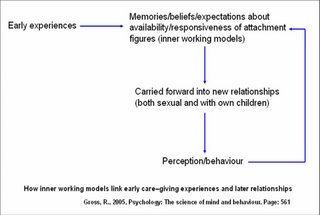
According to Waldrop & Halverson (1975), boys’ relationships are extensive, while girls’ are intensive. Boys’ friendship groups are larger and more accepting of newcomers than girls’. The level of competition between pairs of male friends is higher than it is between strangers – the opposite of girls. Despite some important gender differences in friendship quality, collaboration and cooperation are most common forms of communication in both boys’ and girls’ friendships.
The evaluation of Erickson’s theory defines as follows:
The sequence from identity to intimacy may not accurately reflect present-day realities. In recent years, the trend has been for adults to live together before marrying, so they tend to marry later life than people did in past. Many people struggle with identity issues at the same time as dealing with intimacy issues.
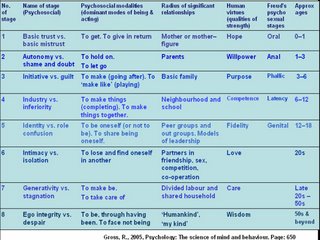
Additionally, some evidence suggests that females achieve intimacy before ‘occupational identity’. The typical life course of women involves passing directly into a stage of intimacy without having achieved personal identity. Sangiuliano (1978) argues that most women submerge their identities into those of their partners, and only mid-life do they emerge from this and search for separate identities and full independence. There’s also a possible interaction between gender and social class. Or example, working-class men see early marriage as a ‘good’ life pattern: early adulthood is a time for ‘settling down’, having family and maintaining a steady job. By contrast, middle-class men and women see early adulthood as a time for exploration, in which different occupations are tried. Marriage tends to occur after this, and ‘setting down’ doesn’t usually take place before 30 (Neugarten, 1975). There’s also evidence of an interaction between gender, race and culture. As Gilligan (1982) has observed: the female comes to know herself as she is known, through relationships with others.
Marriage is an important transition for young adults, because it involves a lasting personal commitment to another person, financial responsibilities and, perhaps, family responsibilities. Marriage and preparation for marriage can be very stressful. Davis (1956) identified mental disorders occurring for the first time in those who engaged to be married. Typically, these were anxiety and depression which began in connection with an event that hinged on wedding date. Since the disorders improved when the engagement was broken off or wedding took place, Davies concluded that it was the decision to make the commitment that was important, rather than the act of getting married itself.
Couples who live together (or cohabit) before marriage are more likely to divorce later, and be less satisfied with their marriages, than those who marry without having cohabited. Also, about 40 percent of couples who cohabit don’t marry. While this suggests that cohabitation may prevent some divorces, cohabits who marry are more likely to divorce.
It’s long been recognised that mortality is affected by marital status. Married people tend to live longer than unmarried people, are happier, healthier and have lower rates of various metal disorders than single, widowed or divorced.
Tuesday, April 11, 2006
Why children abscond from home?
When children at development age (6 months–21 ages), he will start to discover his body and naturally want to explore his anatomy. Some children realise that he has got dangly bits down there and will want to be aware of what he can and can’t do in terms of what hurts and what doesn’t – it is completely innocent.
Sometime it might feel embarrassed when he does some mistake while out in public. But some people will laugh it off and will understand that it is just one of those things children do.
It is OK to discourage the children from his bad habit as long as you keep things low key. We shouldn’t scold him from doing this – or it could lead to bigger issues later in his life. If parents shout at him doing this, then he will feel embarrassed about his natural urge and ashamed of him. He could then grow up with complex.
Gentle reminders or convinces are a good way of just alerting him to the fact what he is doing and that should be enough for him to stop and realise that there is a time and place to discover his anatomy.
The only way parents will over – react is if they are constantly telling him not to do it. It is best to turn a blind eye now and again, or he could start to use his behaviour as a tool to get their attention.
It is the same with children who pick their noses. The habit starts off innocently when they need to clear their nose but don’t have a tissue paper.
The automatic reaction is to use finger but they are reprimanded and told this is a dirty habit – so they end up doing it when they think no one’s looking or deliberately in order to get their parents or other attention.
Equally if parents laugh – even out of embarrassment when they repeat it for a reaction, whether it is good or bad. It is all about good manners. Parents have to discourage children’s unsavoury habits but without shaming them into submission.
Let’s move topic on the pragmatism of children who run away from home. There are so many reasons behind it: want more freedom than their parents would give them, poverty, domestic violence, appraise like others to get experience and so on. Once they run away from home, they start begging for food or do different stuff of job for food, and started sleeping in the streets, under bridges, in ditches or camped in a tent with friends. For while vulnerable youngsters will still flee home to escape abuse, neglect or family conflict, there will be fewer places to keep them safe. The problem is immense. Because most of runaways start to seek help from other adults who may harm, exploit or hurt them. Heartbreakingly, these under – 16s fall victim to pimps, paedophiles, drug dealer and some of them can’t cope and will come back to home. At last but not least, it is really dangerous life they live on the streets. Some of them are lucky who will be offered them by good people to help them for their good life.
Monday, April 10, 2006
How can we be better off?
How ever, developed countries people benefit even further because of the development. For them, it will be about how to enjoy a better life and like having holidays, travelling around. How can we be better off? It is a good question, isn't it?
Sunday, April 09, 2006
Brunel 200










Friday, April 07, 2006
Politicians and Journalists:
I think politicians derive their authority from people sometime and in that case the media and journalist must strive to represent the interests of the people. Journalists do that partly by asking the questions witch people want answered however uncomfortable that that may be for politician. I think we cannot nourish democracy by “protecting” politicians if anything, we weaken it. And there is one more question arises, can media claim as opposition of politicians in that case? Of course not because it would be an abuse of their power (lets use the word “influence” to power) if they claimed to be real opposition to the government or related bodies.
Journalists and media play necessary democratic function (as against commercial function) is to provide information as fully and fairly as possible, which will allow those to make informed judgements-including about those they choose to govern them; and to act as media for diverse opinions.
Saturday, April 01, 2006
Does love mean never having to feel sorry?
I know nobody is ideal in everything. We go university and do different research however it doesn’t mean he/she is ideal in that particular thing. There are so many things we learn everyday by interacting and talking each other.
Nobody is ideal in Love so that we should feel sorry if we were wrong on something which hurt him/her. Such kind of feeling erase misconception between each other and we can understand each other in future. Especially in love, it needs nurturing, friendship, understanding, patience, caring, maturity, practicality, forethought, hindsight so on between each other. We are human beings so that sometime we apologise and feel sorry at times. It is a mutual understanding. It should not come in terms of ego and superiority.
I think ‘feeling sorry or apologise’ is an action of psychological feature that is outside of our area of influence. I mean, we do something or say something which is entirely usual for us but other person (boyfriend/girlfriend) takes it in a totally different way. Then, it is naturally we feel sorry for it. Now, there is one question arise whether we have to explicitly ask sorry depends on person’s (boyfriend/girlfriend) understanding. Can we stop our self from feeling sorry for something we have done to our loved one?
‘Feeling sorry or apologise’ is a function of comfort level where he/she knows that we would not have deliberately set out to hurt, harm, anger, bewilder or confuse that said to him/her. Hence, we don’t need to have to convince him/her of our feeling of sadness or guilty sometime. Confucius says in this term, we don’t have to say sorry, even if you feel sorry because what we feel, it will be felt by the other person as well.
We know that we don’t intend to hurt anybody however he/she feel bad that we hurt him/her, which it shows in their actions, in their voice, in their words and behaviour. The actual word ’sorry’ and ‘apologise’ don’t have to enter the conversation at all. Let’s make a small interesting scenario:
X and Y fight. They both make mistakes.
X says sorry to Y. Y says nothing.
Y tells X that he/she is hurt.
X says sorry to Y again. Also tells Y that he/she is hurt as well.
Y still doesn’t apologise.
X feels cheated that both people made mistakes but Y never cared to apologise.
Next time a fight happens, X feels sorry, but keeps that thought to him/herself.
It starts a downward spiral of gargantuan proportions. A situation that could have been solved by the saying of the sorry, rather than taking it differently or easily. I think, never saying sorry in love is a tad bit extreme. We are likely to make mistakes and hurt the other person, and not to apologise for it which can be disastrous depending on how immense the hurt.
Sometime we ask sorry just to make somebody superior which shows admitting to a lack of confidence (emotion & personality) and that change his/her opinion towards us. I think the value of a sorry is reduced when we have to ask for it. Even if the sorry is genuine, one cannot help wonder if the other person is saying it with sincerity or simply paying lip service, and that doubt can cause more problems.
Tuesday, March 28, 2006
Slow Dance
Have you ever watched kids
On a merry-go-round?
Or listened to the rain
Slapping on the ground?
Ever followed a butterfly's erratic flight?
Or gazed at the sun into the fading night?
You better slow down.
Don't dance so fast.
Time is short.
The music won't last.
Do you run through each day
On the fly?
When you ask How are you?
Do you wait to hear the reply?
When the day is done
Do you lie in your bed
With the next hundred chores
Running through your head?
You'd better slow down
Don't dance so fast.
Time is short.
The music won't last.
Ever told your child,
We'll do it tomorrow?
And in your haste ,
Not see his sorrow?
Ever lost touch,
Let a good friendship die
Cause you never had time
To call and say,"Hi"
You'd better slow down.
Don't dance so fast.
Time is short.
The music won't last
When you run so fast to get somewhere
You miss half the fun of getting there.
When you worry and hurry through your day,
It is like an unopened gift....
Thrown away.
Life is not a race.
Do take it slower
Hear the music
Before the song is over.
Tuesday, March 07, 2006
The rise of the machines:
I always remember when I was doing secondary level in Nepal and used to go village on summer vacation. The villagers used to ask me different questions like: have you travelled in train, have you travelled in airplane, have you seen that thing and so on. They used to imagine and I used to feel proud that I have seen and travelled. I was lucky in that sense because I used to live city and had got opportunity to experience and see all those things. In this statement, I want to argue that they are not backward. The only thing is they haven’t got opportunity to use or see.
Moore’s law is the proof that technology changes all round us at steady and constant rate. By the time we stop and think about just how quickly we adapt to and become dependent on new developments that new technology is quickly superseded. It won’t be long until the amount of processors on a single computer chip matches and then beats those organic switches that make up the human brain.
Today, technology is everywhere, in our homes, cars, shops, bank, universities, workplaces and it’s growing ever powerful. One day technology is going to be everything, and by then it might just be powerful enough to start making its own mind up. Let me give you one small example that when we do mathematics calculation then most of us use calculator, hand writing skills are disappearing because of computer. Our life has changed and we are doing quicker, faster and very efficiently even high complex things. Paradox is that new technology is created to make human existence easier. Even, Most of the developed countries’ economy is based on knowledge based economy which refers high skilled man power. I have tried to explain this statement by following diagram:

H= Human M= Machine
I think humanity has managed to put itself in the situation on a number of occasions throughout the centuries. Of course, the transition period is the difficult period but society adapts. If we go back 100-200 years there were vastly more people doing labouring jobs where now the workforce has advanced and adapted and become more skilled in different areas. Let’s imagine that what’s perhaps different this time is that we are creating intelligent machines, and machines are now becoming more intelligent than certain sectors of the population, which is going to cause problems. This is the new factor.
Because of technology different types of question arise that new technology is created to make human existences easier but new technology replaces the need to employ humans. The most constant equation of life is that we exchange labour for money. So if we rendered this surplus to requirements by new advance technology (Robots, ATM and so on) then what do we have left to offer in exchange for money? I do believe that there is light at the end of the tunnel, and it’s not necessarily from a robot-driven train.
I think new technology will affect or it eventually serve to make our lives harder on some society or certain age of groups of people in short term but I don’t think it will make our life style complex or harder. I don’t think the scientist want to look at the big picture while creating new powerful robot. Only the future can tell but there is no turning back, it should keep moving forward. It tends to happen when a workforce is replaced by machines, they will try to find another substitute work or job or some case different job as well. After industrial revolution, money is almost a constant, it’s the sense of value and it will find a different way of investing itself in people doing things. Its people doing things that make the economy run and I don’t doubt that we will adapt to find new ways of running the economy. It’s just that we get these interim periods where we almost scrap a generation of workers; morally and ethically that’s difficult to come to terms with.
Wednesday, February 08, 2006
Friday, February 03, 2006
Time to cut out the waste:
There are more than thousand of jobs waiting to be created in clean energy, energy-efficiency, recycling and public transport. About thousands of people – mainly older people and very young die in Nepal each year because poverty prevents them from properly heating their homes.
The reality is that oil is a finite resource. As it depletes, and demand grows, it will increase in price, and that is what we witnessed after Hurricane Katrina’s effects on US supplies.
With the growing industrialisation of China an India, the situation is only growing to get worse. A responsible government would be planning for when oil is even more expensive and in short supply. Industry analysts predict crude oil will double its present price within the next few years.
We have seen the upset petrol pump price rises of a few paisas (Nepalese Currency) per litre can cause, so there is a real potential for huge civil disruption when peak oil predictions come true. We need to dramatically reduce the oil dependency of our economy which makes us vulnerable to periodic shocks and disruption.
We cannot afford to wait until petrol stations run out of fuel to act, or the floods caused by global warming are at out door – because that will be too late. We must develop alternative and sustainable transport solution now. This means improving public transport and encouraging development of low – carbon transport systems. We have had several fuel crises in as many decades – how many do we need to suffer for Government to wake up?A major culture change is needed. Now is the time to recognise the challenges of global warming and the dangers inherent in Nepal’s continuing reliance on oil – the supply of which is vulnerable.
Now is the time for an environmental leadership that sees an opportunity for safe and low – carbon energy systems. Fossil fuels are not the only thing in finite supply, so is cash.
Water power is a must for Nepal if we are to tackle climate change. Obtaining energy from wind power is just one facet of the dramatic changes we need to make in the way we live on this planet.
 New buildings should have micro – generation solar panels or wind turbines installed to reduce electricity demand and greenhouse gas emissions. A panel fitted to a roof reduces energy and expense involved in heating water, and can cut water heating costs by 50 percent.
New buildings should have micro – generation solar panels or wind turbines installed to reduce electricity demand and greenhouse gas emissions. A panel fitted to a roof reduces energy and expense involved in heating water, and can cut water heating costs by 50 percent.Massive investment in renewable energy is required. Nepalese government is failing miserably to invest and support renewable technologies, the only real way to harness climate change.
Thanks to our climate and mountain’s river, Nepal is uniquely placed to generate energy from renewable sources – such as water, solar and wind power, which are clean, cheap and safe.
They do not rely on massive subsidy from our tax, or a scarce and finite supply of high – grade uranium, nor will they are irreparable harm to our world and our health.
It is time to tell world and specially India to abandon the dirty and dangerous nuclear power industry in favour of renewable sources – and invest heavily in energy conservation measures.
Thursday, February 02, 2006
Analysis of a normal lifespan:
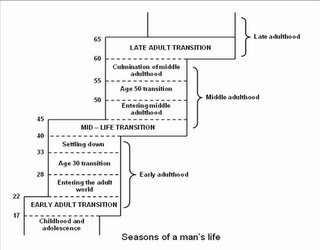
In The Seasons of a Man’s Life, Levingson et al. (1978) advanced a life-structure theory, defining life structure as the underlying pattern or design of a person’s life at any given time. Life structure allows us to ‘see how the self is in the world and how the world is in the self’.
In The Seasons of a woman’s life (1997), Levinson and Levinson presented their finding for 45 women (aged 35 to 45), comprising 15 homemakers (full-time housewives/mothers), 15 businesswomen and 15 academics. The broad pattern of developmental periods based on the original male sample was confirmed. But men and women have been shown to differ in terms of their dreams.
Women’s dreams and ‘gender splitting’:
Levinson (1986) argues that ‘gender splitting’ phenomenon occurs in adult development. Men have fairly unified visions of their futures, which tend to focused on their careers. But women have ‘dreams’ which are more likely to be split between a career and marriage.
Conti.......
References:
Gross R. (2005), "Psychology The science of mind and behaviour" 5th edition, Hodder Arnold, London NW1 3BH
Wednesday, February 01, 2006
Is Time really money?
Let me move from those maudlin stuffs, it has gone and past now. There is also one proverb that past is to remember, future is to wish and present is your real time, utilise it very carefully. Long time ago, I had read one article in The Times newspaper “Scientists show that time really is money”. I am trying to go through it which I can remember and few of them are my own personal experiences.
Most of us know that time is money. In economic, wages or salaries have given an indication of how we are valued at work which can refers traditional way however, by looking at salaries against taxation, the cost of living, we can see how much an hour of our time is worth whether at work or home. We can calculate it by using a mathematical formula for the monetary value of every minute of a person’s working life. Ian Walker, a professor of Economics at Warwick University has given a very simple formula to calculate it is: V= (W(100 – t)/100)/C, where V is the value of an hour, W is a person’s hourly wage, t is the tax rate and C is the local cost of living.

This helps us to understand that as the value of our time rises, we are likely to buy more of it, which explains why people are paying to save time, like having someone to cut the lawn or clean the house. In other word, it shows a person’s working life by showing the precise cost of a lie–in, an extra hour at the office or even brushing one’s teeth. This formula also refers to think about how to value and use our time more effectively; vital in an age when many people feel as through they have less time to spend in the way they want to.
Monday, January 30, 2006
Enigmatic Commitment: (3)
Most of the men are not only hungry to give love but they are starving for it as well. When his relationship fail he finds himself depressed and stuck in alone. He stops caring and doesn’t know why he is so depressed. It is difficult to be motivated when he is not needed. To make him motivated again, he needs to appreciated, trusted and accepted. If he does not motivate then he start kill himself slowly, in other words, it is a slow death for a man. He starts drink, smoke and get involved in fight or unnecessary argument. I can remember, I was nearly to fight with one guy in Mall last week. I started smoking heavily again (I am regretting and punishing myself). Neither, I like anything nor I care anything nowadays (stopped talking with most of the friends because they may tell something which can hurt me more). Sometime I think to go far away from this city but I don’t know where I can get peace.
Generally, Men and Women have different emotional needs. Typically, Men give in relationship what he wants and Women give what she wants. Women instinctively appreciate the little things. The only exceptions are when a woman doesn’t realize a man needs to hear appreciation. When a woman feels unloved and neglected it is hard for her automatically to appreciate what a man does do for her. She feels resentful because she has given so much more than he has. This resentment blocks her ability to appreciate the little things. I can remember, when I told her I quit smoking and was excepting to hear her appreciation but she didn’t tell me except how are you feeling now? Did you find hard to quit? I was thinking she might become happy that I quit smoking because she just told me once which can make her feel that I really care a lot. Sometime, both Men and Women think they give and give but do not get back which can feel their love is unacknowledged and unappreciated. Most of the Men strive for greater and greater success because they believe it will make them worthy of love. I have noted few of the points which are taken from the book about women and men expect from each other.
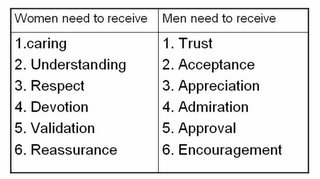 A men’s deepest fear is that he is not good enough or that he is incompetent. He compensates for this fear by focusing on increasing his power and competence. Success, achievement and efficiency are far most in his life. A man appears most uncaring when he is afraid. Just women are afraid of receiving, man are afraid of giving. To extend himself in giving to others means to risk failure, correction, and disapproval. These consequences are most painful because deep inside his unconscious he holds an incorrect belief that he is not good enough. This belief was formed and reinforced in childhood ever time he thought he was expected to do better. When his accomplishments went unnoticed or were unappreciated, deep in his unconscious he began forming the incorrect belief that he was not good enough.
A men’s deepest fear is that he is not good enough or that he is incompetent. He compensates for this fear by focusing on increasing his power and competence. Success, achievement and efficiency are far most in his life. A man appears most uncaring when he is afraid. Just women are afraid of receiving, man are afraid of giving. To extend himself in giving to others means to risk failure, correction, and disapproval. These consequences are most painful because deep inside his unconscious he holds an incorrect belief that he is not good enough. This belief was formed and reinforced in childhood ever time he thought he was expected to do better. When his accomplishments went unnoticed or were unappreciated, deep in his unconscious he began forming the incorrect belief that he was not good enough.Just as women are sensitive to feeling rejected when they don’t get attention they needed, men are sensitive to feeling that they failed when a women talks about problems. This is why it is so hard for him to listen sometimes. He wants to be her hero. When she is disappointed or unhappy over anything, he feels like a failure. Her unhappiness confirms his deepest fear: he is just not good enough. Many women today don’t realize how vulnerable men are and how much they need love too. Love helps him to know that he is enough to fulfil others.
At last but not the least, my comment with her became enigmatic so I could not fathom what should I name it? Unfortunately, I am fatigued with everything and want to cry on her arm like small kid.
Thursday, January 26, 2006
Enigmatic Commitment: (2)
I have taken few of the relevant quotes from the book according to my experience. I found that when women pull away then Men started get curious towards her. They (Men) started trying to get closer to her. I can remember that when I did call on her mobile. She didn’t reply at all. I left voice messages that I want to talk to her. On that period, I had really miserable time. When I felt that I am fully separated, then suddenly I felt my need for love and intimacy again. I think she might be surprised and called me after four weeks. I tried to explain my feelings to her and requested her few time to meet. She agreed to meet me but changed her plan again and at last we met on Saturday. How do I explain my feelings and happiness on those eight days? Nobody can imagine even I can’t explain in words that how much happy I was when she said she wants to meet me. I changed my daily routine even I stopped smoking because she knew that I was still smoking. I started reading and asking friends that how can I impress her. I was waiting a good moment so that I can listen her feelings and tell her about my feeling as well. It is worth to say that in Love few hours are also memorable in life. My flat mates started asking that am I really in Love? When I used to come home from work, I used to ask my flat mate Stephen to dance with me in Nepali songs. He was really surprised by seeing such a change in my behaviour.
I think Women pull away for different reasons. Sometime she does not understand Men’s feelings and afraid of being hurt again. Sometime, when Men disappointed her that makes also pulling away from Men. I can remember one incident that when we met last time on Saturday. When we went to buy suit for post – graduate ceremony at Mall on my request, one mature woman started asking me that I had day off and all those stuff. I tried to ignore her and told her that she always shows too much interest towards me but I don’t like her and there are few other girls as well whom I don’t like at all. I also told her that my family are asking me to get marry. But in my view, I was telling her indirectly that nobody can take your position. You are the only person whom I can trust and will be happy. I am pretty sure, my statement (in my innocence) hurt her but I had not any mean to hurt her. It took me far away from her and today our communication broke out. It did hurt me as well because she didn’t understand me and trust me. To know a person, it can take ages then how can she evaluate me in few words and days?
Men always pull away to fulfil his need for independence or autonomy. When we met second time at my work place and went to city centre. I had a lot of things to do. I was trying to sort all those work first then give her more time. I used to call her once in a week and then used to make myself occupied by different unsolved work. I was trying to establish myself on her level. When I felt that I finished some degree of work then I motivated to give my love and receive the love and care I need. I think it was not my fault because it is Men nature which I knew by reading this research book.
I found only one place where some of us express our feelings. I always remember one thing when we get frustration at that time we start praying God, you know why? Because we believe that God listens everything what we are saying but never reply. Perhaps, this is the way of life goes. Krishna has explained in Bhagavad-Gita when human beings allow their mind to muse on objects of sense-enjoyments, an attraction for them is created. Attraction develops into craving and from craving follow causes for anger. Anger produces delusion. Delusion confuses the memory and understanding of things; from this confusion of understanding follows the disintegration of the power of discrimination; with discrimination gone, the human perishes.
 The top secret of difference in coping with stress in Men and Women are: When Men become stress, they are increasingly focused and withdrawn. They feel better by solving problems. Men want to make improvements when they feel that they are being approached as a solution to problem rather than as the problem itself. But Women are increasingly overwhelmed and emotionally involved and they feel better by talking about problems. Continued......
The top secret of difference in coping with stress in Men and Women are: When Men become stress, they are increasingly focused and withdrawn. They feel better by solving problems. Men want to make improvements when they feel that they are being approached as a solution to problem rather than as the problem itself. But Women are increasingly overwhelmed and emotionally involved and they feel better by talking about problems. Continued......Monday, January 23, 2006
Enigmatic Commitment: (1)
Few days ago, I was reading “Men are from Mars and Women are from Venus” and I used to take it my work place as well to read it in free time. Last Friday, one of my work colleague started giggling to me when he saw that book without taking any interest about it. I tried to convince him that it’s really conversant book in which the writer has tried to explain about the difference between Men and Women communication style, its meaning and how it can affect in relationship life. John Gray (the writer of this book) has given his own family example and how he had felt in such situation which really encouraged me to write about my feelings today. It is very much true that you can’t live with them, and you can’t live without them! I think my feeling and experience will really assist somebody, if not, then it will help me to remind in future that I had gone through it.
Everybody have different view and experience about identical obsession and the answer will be also different. To explain it, I can give very simple example, which, most of us have gone through it. Let’s imagine, two observers are observing an earth, in that situation if we ask that what they are thinking about it. I am pretty sure that there will be bit different answer because everybody explains how they have experienced, felt, sense and so on about it in different time and situation. Fritjof Capra has stressed it in terms of relative theory which has shown in drawing as below. If observer A sees the apple to his left and slightly inclined, so that the upper end is nearer to him. On the other hand, Observer B sees the apple to her right and in such a way the upper end is farther away. By extending this two dimensional example to three dimensions, it becomes clear that all spatial specifications – such as ‘left’, ‘right’, ‘up’, ‘down’, ‘oblique’, etc – depend on the position of the observer and are thus relative. The temporal order of two events was assumed to be independent of any observer. Specifications referring to time – such as ‘before’, ‘after’ or ‘simultaneous’ – were thought to have an absolute meaning independent of any coordinate system.
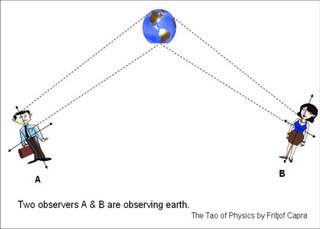 To be honest, when I left Nepal since then I started living alone. This loneliness took me far from everybody and today far from you. I never gave few minutes to think in those six years about the love and caring which you gave me in few days. I instinctively felt a need to talk about my feelings with you. I was not immediately concerned with finding solutions to my problems but rather tried to find relief by expressing myself and being understood. Alas you broke our communication and I came back my lonely world again. I tried to explain you but you didn’t give me any chance.
To be honest, when I left Nepal since then I started living alone. This loneliness took me far from everybody and today far from you. I never gave few minutes to think in those six years about the love and caring which you gave me in few days. I instinctively felt a need to talk about my feelings with you. I was not immediately concerned with finding solutions to my problems but rather tried to find relief by expressing myself and being understood. Alas you broke our communication and I came back my lonely world again. I tried to explain you but you didn’t give me any chance.
When I had not met you, I was lonely but I was not that much piteous how much I am today but I learned so many things. Today, I am going through few of them to analyse which I can remember. In this process, I may be right or wrong because it is just one sided because I don’t know her affection towards me. I might be wrong person or not her type of person.
Why did you thieve my heart if you had to break it?Why did you become my sweetheart if you had to make me alone?Why did you break my heart, why did you fall in love, why did you go away, away, away and far away? Continued...
Wednesday, January 11, 2006
The state we are in:
The media have been all agog over the rise of crises in Nepal. Women, children and other non-combatants are being primary victims. The key characteristics of the war in Nepal at high risk of internal fighting are neither political nor social, but mere economic. Maoist rebel leaders form themselves as heroically fighting to guide in an era of liberty and prosperity. However it seldom works this way. Civil war typically leaves a legacy of economic, social and political ruin. But the damage extends to neighbour countries because drugs and terrorism flourish and spread from regions of disorder, even they appear to be isolated from their country which is happening in India now. Another common consequence of rebellion and disorder is rape, strike and fight.
According to World Bank calculations, the total of 2.3 billion people in China and India, nearly 1.5 billion earn less than $2 a day. Both are poor, largely agricultural countries. Nepal is also poor where around sixty percent people depend in agriculture. China, India and Nepal are sailing in same boat however Nepal didn’t choose its main priorities as unemployment and a spirit of nation’s atma vishwas (self confidence); we can take several such examples a kind of substantial growth seen in Japan in the 1950s and 1960s, South Korea in the 1970, China and India today.
Nepal's foreign policy is also good between China and India. There are more influence of India than China because of open border, culture, and climate. Today, India high-tech is not the sole preserve of the rich. Auto rickshaw drivers began using mobile phone so that customers can call for a ride. Technology companies are extending internet connections to the remote locations. Small, renewable electricity generators are appearing in villages, and the government is using home- grown space technology to improve literacy skills and education in far flung areas. This knowledge revolution has begun in our neighbour countries. Conventional wisdom now suggests that globalisation is responsible for this feat. But does Nepal have it as a nation and, if not, what must Nepal do to get it?
Nepal’s illiteracy is reducing only at the rate of 1.3 percent per annum. At this rate, Nepal will need another more or less 50 years to attain a literacy rate of 95 percent. We cannot be industrially and economically advanced and we cannot be technologically advanced unless we are scientifically advanced. One of the critical issues facing Nepal is the gulf between the academic world and industry. Science too has its role to play. The notion that scientific ideas lead to technology and from there to wealth is not widespread. Nepal needs economic liberalisation and competition between Nepali companies which is being tamed, so they are under no pressure to come up with new ideas, nor did academics promote their ideas to industry.
Of course, people are going India, Arab and Developed Countries for employment because of political instability and lack of opportunity for employment and government’s future policy. Some of them are attempting to gain illegal passage to developed countries by holding false passport and documents. Despite the perception that Nepalese immigrants tend to be deprived illiterate prone to crime, Nepalese who emigrates is not that country's most destitute citizens. They tend to come from the mid-skilled classes, not from the poorest. More than anything else, it is a perceived lack of opportunity that encourages citizens to leave country. Government is also encouraging those who are going aboard to train different skills so that their income will increase by many folds, and has already made the first move a program to provide loan through banks to those who cannot afford money to go abroad.
Most of the people in Nepal dream of being overseas so that they are watching foreign channel rather Nepal TV, are also the main source of aspiring to be somewhere else for better future and employment. So many Nepalese dream of leaving significantly threatens Nepal's economic development, social well-being, and political stability. Every year Nepal loses two to three percent of its GNP to brain drain. Nepal loses between 1,000 and 2,000 professors, doctors, and engineers and high skilled professionals annually. This loss means fewer well-educated, ambitious citizens who could help lead our country. However there is an irony here, for if through immigration Nepal loses capital in some forms; gains it through the money its immigrants send back to their families. If we look at the number of households receiving the remittance in Nepal, it increased from 23 percent in 1995/96 to 52 percent in 2003/04, contributed close to about 12 percent to the Nepal’s GDP.
Rich countries like Arab and other Developed countries want migrants' labour, but do not want to look after these newcomers when they grow old. Ideally, rich countries would like a constant rotation of workers, arriving while they are young and active, leaving before they grow old and dependent. For its part, temporary and circular migration is also better for poor country like Nepal. One reason is remittances: the longer an immigrant stays away from home, the smaller the share of his/her wages he/she sends back. In Germany, the same phenomenon happened in reverse. The availability of cheap guest-workers in German factories slowed the adoption of new labour-saving technology. As the saying went at the time: Japan is getting robots while Germany gets Turks.
Nepalese households invest more than half of their savings in physical ones such as land, houses, cattle, and gold instead of putting money into financial assets. In rural areas, the proportion is even higher. This fact shows that Nepalese people mistrust of banks and are the largest consumers of gold. Let us take an example in Pokhara, there have been invested to build houses but they are all empty. Households could earn higher returns by investing in financial assets, and the country would be better off if savings were pooled to finance more productive investments.
This dilemma may help explain why the Nepalese government can seem unsure about security, unemployment, and social stability. There is confrontation between three parties: government, political parties and Communist follower “Maoist”. If we ask about the current situation to them, they give a very simple answer without taking any responsibility that we don’t have a lot of resources like India and China. Now, our greatest resource and valuable export is our human potential. That's a powerful incentive, even if it does spank of actively encouraging a brain drain from developing countries like Nepal. But then, India’s Late Prime Minister Rajiv Gandhi's well-known prescription still holds: "Better brain drain than brain in the drain". Competition for brains and ideas is where the battle for global influence should be waged.
Above all, Nepal should learn from the experience of other countries to avoid killing incentives for work rather than encouraging people to go abroad, and should make it easier for workers to learn new skills, so it is all the more important to invest in education. All that is needed is a more welcoming environment for foreign educational institutions, investor and students, as well as a greater tolerance for market in tourism. Nepal needs to revitalise its economy, modernise its institutions, rewrite the contract between the members of society and recover its self esteem. I could go on and on, but the point should be clear that Nepal's future is in Nepalese hands and will be what Nepalese make of it.














